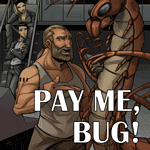Jefferson Smith is an Indie author and blogger who has hit upon what I think is an amazingly great conceit for a book review series: he’s started exercising, and he uses a treadmill. Each time he exercises, he starts reading a book. Will the book keep him interested through the entire 40-minute workout? If it does, he explains why. If it doesn’t, he explains why not. He calls this the Immerse or Die Report, and I think it’s brilliant.
(Full disclosure time: yesterday he featured Pay Me, Bug! on this report, and it went the full 40 minutes. So, let’s be completely honest here, I might just be a little biased.)
The format of these reviews are roughly analogous to “three strikes and you’re out” in baseball. Each time Jefferson Smith runs across something in the book that trips him up, he highlights it in his review. Usually by the third time the book trips him up (he describes them as “WTF moments”) he’s usually completely thrown out of the book and that’s the “break point” where he gives up–though it should be noted that the “break point” is in the context of “it got to the point where I couldn’t enjoy the book while I was exercising.” There is at least one review where he says he feels the book is stronger than the review suggests, and it may be this particular form of reading (while you’re engaged in strenuous physical activity) lends itself to certain types of stories and storytelling than it does to others. But the observations he makes are well thought out and clearly stated.
I think this format of review can actually be very useful to authors as much as readers because the “WTF” sections immediately highlight parts of a book that can then be looked at more closely. Something in the book drew a reader out of the story–can you see what it is? Can you see how it might happen? More importantly, is it something you feel you should change, or is it a risk you have to take because it achieves another goal?
That last question is an important one, and it’s a risky question to answer. Sometimes when a reader hates something, you need to look at it more closely and decide “yeah, I need to change this.” Sometimes when a reader hates something, you need to look at it more closely and decide “nope, it stays. I’m just going to have to take it on the chin.” 1
This is a risk anyone who tells a story will have to take. Someone who wants to tell a story using a formal, grand narrative voice will dinged by people who want language to feel more natural. People who want to tell sparsely-described stories that require the reader to fill in a lot of details on their own will get dinged by people who want a more complete picture as they read. In the end a lot of writing is trying to get the reader to abandon what they want the story to be and get them to buy in to what you want the story to be, and if their desires are too far from your own, well… you lose that reader, and it’s not because they’re wrong, it’s because they don’t want what you’re offering.
Immerse or Die gives a very clear picture of what one reader wants when he reads, in an unusual and entertaining format. Other readers will be able to compare his preferences with their own, and evaluate accordingly. Authors will be able to see his preferences and decide for themselves how compelling a case he makes (though I don’t agree with all the “WTFs” in his reviews–some of the things that bother him in stories don’t bother me in the least–he describes them, and describes why they bother him, extremely well) and use those data points in future efforts.
Immerse or Die is a great idea, and I hope it becomes very, very popular. If you’re interested in reading more indie-produced work but don’t know where to start, consider bookmarking this site and giving the reviews a go.
Footnotes
- For example, during a very early stage in Pay Me, Bug!’s history, a test reader really, really hated Grif, to the point where the protagonist of the book made him want to throw the book across the room. The reasons he gave for hating this character were clearly described and well-stated… and in the end I didn’t take the criticism. I didn’t ignore it–it was valuable. It told me that the protagonist of my novel was a specific type of character that not everyone enjoyed reading, and that Grif’s tendency toward… um… smartassery would throw some people out of the story. But Grif’s story was the one I wanted to tell, so I decided I’d just have to accept that and go forward regardless.


